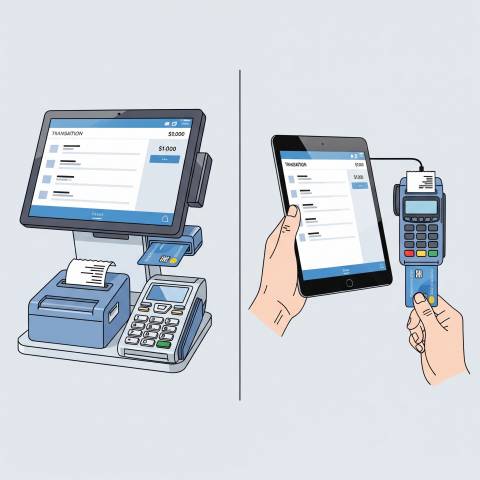
The UK retail scene is changing fast. Customer expectations are higher, e-commerce is everywhere, and technology is moving quickly. At the centre of this shift are point of sale systems (POS software). A POS is no longer just a cash register, it handles sales, tracks customer data, connects with other tools, and keeps customers engaged.
Choosing the right system isn’t just a purchase, it’s an investment in your bottom line.
The New POS Landscape in the UK
Retailers face tougher competition than ever. Online ordering is widespread, and shoppers expect smooth experiences whether they buy in-store or online. To keep up, stores need POS systems that tie together sales reporting, inventory, and customer information. Old hardware and software are fading because they can’t keep pace with these demands.
What’s Driving POS Innovation?
- Faster, better service: Customers want quick checkouts and personalised interactions.
- Smarter insights: Real-time analytics help track stock, sales, and staff performance.
- Omnichannel shopping: Stores need systems that handle click-and-collect, online returns, and seamless cross-channel shopping.
Several factors are propelling innovation in POS systems. The demand for enhanced customer experiences, including faster checkout processes and personalised interactions, is paramount. Furthermore, businesses seek greater operational insights through real-time data analytics, improved inventory accuracy, and streamlined staff management. Using both online and offline together helps stores handle things like click-and-collect and returns more easily.
What to Look for in a POS System
Choosing the right POS takes more than comparing price tags. Here’s what matters most:
1. Core Features : What should my POS actually do?
A modern POS should go beyond transactions. Look for:
- Inventory tracking across all stores.
- Reports and analytics to guide decisions.
- Customer tools like loyalty programs and targeted marketing.
- Staff management (schedules, time tracking, commissions).
2. Integration : Will it work with my other apps?
Your POS should connect with accounting apps (Xero, QuickBooks), online shops (Shopify, Magento), social media tools, and loyalty apps. Smooth integration reduces manual work, avoids errors, and keeps customer information in one place.
3. Scalability : Will it grow with me?
Pick a system that can grow with you. Adding new stores, devices, or features should be simple. A good vendor will also keep updating their software to support new trends and payment methods.
4. Security: Is my data safe?
Payment and customer data are sensitive. Your POS must include PCI DSS compliance, encrypted payments, user access controls, and regular security checks.
How to Choose the Right POS
Start with your own business needs. Consider:
- How many sales you handle daily.
- The size of your product catalogue.
- Your industry (hospitality, grocery, fashion, etc.).
Then look at vendors. Ask about their customer support, update history, and training. The best systems come with strong, ongoing support, not just installation.
How to Navigate Between POS System Selection ?
Picking the best POS for your UK business takes a few steps: first, look at what your business actually needs, then check out the vendors and their systems.
How do I figure out exactly what my business needs in a POS system?
The best POS depends on your business. Look at how you operate, your sales volume, your products, and your industry(e.g., hospitality, fashion, grocery). Understanding these details helps you choose the right system without overpaying for extra features or missing what you really need.
How can I check if a POS vendor is trustworthy and offers good support?
The relationship with a POS vendor extends beyond the initial purchase. Reliable technical support, comprehensive training for staff, and consistent software updates are vital for long-term operational efficiency. Prospective buyers should inquire about support hours, response times, and the vendor’s track record for reliability and innovation.
What are the best POS systems to consider for my business?
| POS System | Best For | Key Advantages | Pricing Style |
| Square | Small to growing UK stores | No monthly fees, easy setup, scalable | Free app + pay per transaction |
| SumUp | Micro/small businesses | UK-based, low-cost hardware, e-commerce tools | Low-cost hardware + % fees |
| Zettle (PayPal) | Mobile-first, small setups | Mobile app + analytics, trusted by PayPal | No subscription + % fees |
| Shopify POS | Retailers with online + in-store sales | Seamless e-commerce integration | From £19/mo + transaction fees |
| Lightspeed | Medium/large retailers, complex inventory | Customisable, scalable, advanced features | Subscription-based (higher tier) |
| Clover | Restaurants & full-service retail | Strong hardware, inventory & staff tools | Hardware + subscription |
| Epos Now | UK hospitality & retail | Table management, loyalty, stock control | Subscription-based |
Hardware Considerations: Display vs. Non-Display POS Terminals

The choice of POS hardware significantly impacts the in-store experience and operational flexibility. A primary distinction lies between systems that integrate a customer-facing display and those that operate without one.
POS Hardware: Display or Modular?
Display terminals:
- Show prices and items in real-time, boosting customer trust.
- Let customers sign or join loyalty programs directly.
- Best for fixed store setups, but take more counter space.
Modular setups (tablet + add-ons):
- Use tablets or phones with card readers, printers, and cash drawers.
- Flexible, portable, and easier to upgrade.
- Great for mobile businesses, pop-ups, or stores that want a clean, minimalist counter.
Operational Implications of Display-Integrated Systems
POS terminals with integrated customer displays often enhance transparency during transactions, showing items and prices in real-time. This can improve customer confidence and reduce discrepancies. They may also facilitate customer-initiated actions, such as signing for payments or opting into loyalty programs. However, these systems typically occupy more counter space and are less portable, suiting fixed retail environments.
Advantages of Modular, Display-Free Setups
In contrast, modular or display-free POS setups often consist of a tablet or smartphone connected to separate peripherals like a card reader, receipt printer, and cash drawer. This configuration offers significant flexibility and portability, ideal for mobile businesses, pop-up shops, or retailers who prefer a minimalist counter aesthetic. While they may require separate customer-facing screens if transparency is desired, their modularity can offer cost efficiencies and easier upgrading of individual components.
Payments: Now and in the Future
Your POS should handle today’s payments and tomorrow’s trends.
- Standard methods: debit/credit cards, contactless payments, Apple Pay, Google Pay
- Emerging methods: QR codes, buy-now-pay-later, cryptocurrencies
Sticking with a system compatible with your current processor avoids extra transaction fees and setup costs.
Will my new POS work with the payment systems I already use?
Many businesses already use certain payment processors or gateways. Your new POS should work with these to avoid extra setup costs or changing contracts. It should handle standard payment methods like credit/debit cards, contactless payments (NFC), and mobile wallets such as Apple Pay or Google Pay.
Preparing for Emerging Payment Technologies
Payment options are always changing. UK shops should pick POS systems that can handle new ways to pay, like QR codes, buy-now-pay-later, or crypto if relevant. A future-ready system reduces monthly fees and avoids constant hardware upgrades.
The Future of POS in the UK
UK shops are now using cloud-based and mobile POS systems. These systems save money, keep sales and stock up-to-date automatically, and let staff serve and charge customers anywhere in the store. Mobile POS devices make checkout faster and improve customer service.
POS systems are also getting smarter with AI and data analytics. They can guess what products will sell, suggest what to offer customers, and even help set prices. This helps shops sell more, manage stock better, and give customers a better shopping experience.
|
Trend |
Description |
Benefits for UK Retailers |
Example Systems / Notes |
|---|---|---|---|
|
Cloud-Based POS |
Stores and syncs sales & inventory in the cloud |
Lower costs, multi-store management, staff can access anywhere |
Lightspeed, Vend, Shopify POS |
|
Mobile POS (mPOS) |
Staff can take orders and payments anywhere in-store |
Faster checkout, better service, shorter queues |
Square Terminal, iZettle, SumUp |
|
AI & Predictive Analytics |
Forecasts demand, recommends products, suggests pricing |
Increase sales, optimize inventory, personalized offers |
AI tools in Lightspeed, Vend, Shopify POS |
|
Customer Insights |
Tracks customer behaviour and buying habits |
Tailored promotions, improved loyalty programs |
Analytics dashboards, CRM integrations |
|
Inventory Optimization |
Suggests stock levels and automatic reorders |
Reduces waste, prevents out-of-stock situations |
Automated reorder alerts in cloud POS |
Strategic POS Investment for UK Businesses
A POS system is more than a cash register. It’s a tool that improves efficiency, tracks customer data, supports multiple payment methods, and boosts your bottom line. The right choice balances key features, integrations, room to grow, security, and hardware and software options.
Choosing the right POS today sets your business up for long-term success in a changing retail world.







